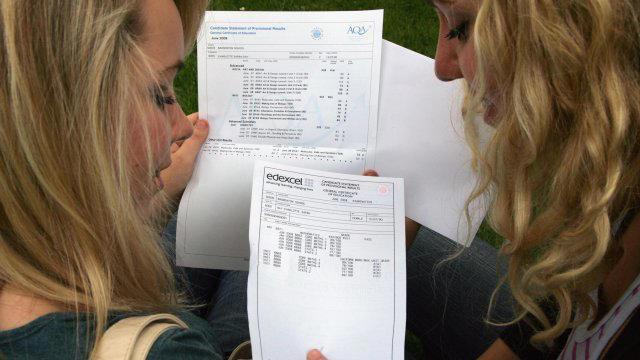








NW Education, Training & Development
CHAPTER 7
Qualifications
[11-13]

Copyright © 2024 by Nigel G Wilcox
All Rights reserved
E-Mail: ngwilcox100@gmail.com
Web Title: paragon-publication.uk
All Rights reserved
E-Mail: ngwilcox100@gmail.com
Web Title: paragon-publication.uk
Designed by GOEMO.de
Powered by S-AM3L1A-NGW
Powered by S-AM3L1A-NGW

Is The Teaching Profession so Black & White?
Parent Site: http://paragon.myvnc.com Paragon Publications UK
QUALIFICATIONS
Story Opinion by Cahal Milmo - msn.com 11.08.23
Inside the A-level ‘shitshow’ as students face triple hit of pandemic, strikes and harsher marking
Plan 'B' for British Students
N & S Divide
Plan B for UK Students:
Like thousands of other 18-year-olds, Jasminder is counting down to Thursday morning with some trepidation. Waiting for her at her east London comprehensive will be an envelope containing not only her A-level results but also a verdict on how she and her peers have weathered three years of grim educational adversity.
They will find out whether they are on course for the university experience they have been plotting all year, or whether their hopes will be dashed – brutally through little fault of their own.
Jasminder’s cohort is facing a triple whammy of uncertainty come A-level results day in England. What will be the fallout of chequered pandemic-style learning, teacher strike action and the Government’s insistence on restoring the exam results landscape back to its pre-Covid norm?
And those from the poorest households will feel the brunt of it all, experts have warned i.
It is all headed for “an attainment shitshow” for 2023’s university intake, according to the blunt assessment of one senior sixth form teacher, who was referring to the fact that some 50,000 of this year’s students will miss out on the top A* and A grades that they would otherwise have been awarded had they sat their exams last year.
There is likely to be a surge in students, and miffed parents, appealing grades. And with university entry requirements more likely to be missed, demand for clearing will surge. Adding further pressure is the fact that 2023 has an unusually high number of 18 year olds all vying for higher education spots and more overseas students seeking a place in Britain.
They will find out whether they are on course for the university experience they have been plotting all year, or whether their hopes will be dashed – brutally through little fault of their own.
Jasminder’s cohort is facing a triple whammy of uncertainty come A-level results day in England. What will be the fallout of chequered pandemic-style learning, teacher strike action and the Government’s insistence on restoring the exam results landscape back to its pre-Covid norm?
And those from the poorest households will feel the brunt of it all, experts have warned i.
It is all headed for “an attainment shitshow” for 2023’s university intake, according to the blunt assessment of one senior sixth form teacher, who was referring to the fact that some 50,000 of this year’s students will miss out on the top A* and A grades that they would otherwise have been awarded had they sat their exams last year.
There is likely to be a surge in students, and miffed parents, appealing grades. And with university entry requirements more likely to be missed, demand for clearing will surge. Adding further pressure is the fact that 2023 has an unusually high number of 18 year olds all vying for higher education spots and more overseas students seeking a place in Britain.
Jasminder feels she and her peers have been cut no slack.
She told i: “The teachers tried their best but I do feel like no-one has given us a break. The pandemic came and it was like ‘you’ll have to work hard to catch up’. We worked hard and then we were told ‘sorry, we’re going to give you lower grades because everyone else after Covid did too well’. And I’m like, where is the fairness in that? Why can’t I do ‘too well’ as well?”
Jasminder, who qualified for free school meals throughout her school years and is hoping for two As and a B to confirm her place to read economics at a leading Russell Group university, looked back on her final years at a state secondary in the deprived east London borough of Newham with something akin to a shudder.
When she sat her A-level papers in maths, biology and economics ten or so weeks ago, they were the first public exams that she and most Year 13s across the country had ever taken after not having to formally sit their GCSEs during the Covid-19 outbreak. Even reaching the A-level exam hall was a triumph of sorts after a pandemic which robbed her cohort of a third of their learning time in the year of the pandemic and then having to deal with disruption caused by strike action in the final weeks of pre-exam learning.
Making matters work, exams regulator Ofqual has decided to restore A-level grades in England to their pre-pandemic levels after two years of higher than usual grades. An analysis this week by the University of Buckingham found that nearly 100,000 fewer of the highest marks are set to be handed out, potentially ending the hopes of thousands of young people of reaching the most competitive universities.
Little wonder, perhaps, that many within the education sector consider Jasminder and her peers up and down the country to be perhaps the unluckiest – or according to some, most neglected – sixth formers in recent history.
She told i: “The teachers tried their best but I do feel like no-one has given us a break. The pandemic came and it was like ‘you’ll have to work hard to catch up’. We worked hard and then we were told ‘sorry, we’re going to give you lower grades because everyone else after Covid did too well’. And I’m like, where is the fairness in that? Why can’t I do ‘too well’ as well?”
Jasminder, who qualified for free school meals throughout her school years and is hoping for two As and a B to confirm her place to read economics at a leading Russell Group university, looked back on her final years at a state secondary in the deprived east London borough of Newham with something akin to a shudder.
When she sat her A-level papers in maths, biology and economics ten or so weeks ago, they were the first public exams that she and most Year 13s across the country had ever taken after not having to formally sit their GCSEs during the Covid-19 outbreak. Even reaching the A-level exam hall was a triumph of sorts after a pandemic which robbed her cohort of a third of their learning time in the year of the pandemic and then having to deal with disruption caused by strike action in the final weeks of pre-exam learning.
Making matters work, exams regulator Ofqual has decided to restore A-level grades in England to their pre-pandemic levels after two years of higher than usual grades. An analysis this week by the University of Buckingham found that nearly 100,000 fewer of the highest marks are set to be handed out, potentially ending the hopes of thousands of young people of reaching the most competitive universities.
Little wonder, perhaps, that many within the education sector consider Jasminder and her peers up and down the country to be perhaps the unluckiest – or according to some, most neglected – sixth formers in recent history.

Teachers’ strikes: A-level results won’t be adjusted for strikes as 50,000 face lower grades © Provided by The I EducationExclusive
A-level results won't be adjusted for teachers' strikes as 50,000 face lower grades
Ministers and regulators insist that a rebalancing of the grades system, however painful, is necessary to maintain the credibility of the exams system. The proportion of A-level students attaining a grade A or above peaked in 2021 with 44 per cent before falling to 36 per cent last year. If grades are to return to 2019 levels, then just over a quarter of pupils will receive the highest grades when they open their envelopes next week – the proportion of A*s is predicted to be almost halved from 14.6 per cent last year to 7.8 per cent.
The immediate result is likely to be an increase in appeals for lower-than-expected grades and a more ferocious than usual scramble for places through the Ucas university admissions clearing service, with places on some 28,000 courses being made available to students who do not receive the grades for their first-choice establishment or perform better than expected. Critics say the
The immediate result is likely to be an increase in appeals for lower-than-expected grades and a more ferocious than usual scramble for places through the Ucas university admissions clearing service, with places on some 28,000 courses being made available to students who do not receive the grades for their first-choice establishment or perform better than expected. Critics say the
sense of harsh treatment for English pupils is exacerbated by the fact that allowances for the pandemic are still being made for A-level students in Wales and Northern Ireland, while results in Scotland this week also remained above pre-pandemic levels.
Ofqual has insisted that this year’s A-level students in England will continue to receive “some grading protection” due to disruption caused by the pandemic. In a joint letter with Ucas to candidates last month, the watchdog’s chief regulator, Jo Saxton, said: “This protection won’t boost your marks by whole grades, but it will mean that the quality of work required to achieve a grade is ever so slightly lower than would have been needed before the pandemic.”
Such a debate is, however, to mask what a growing number of senior educators say is the true scandal behind next week’s results and those for GCSEs a week later – namely, the higher price being paid by children such as Jasminder from the poorest backgrounds for the loss of teaching time during the Covid pandemic and what they say was the subsequent lack of support for those students to recover lost ground.
Several leading education figures and experts told i that they expect this year’s A-level results to provide evidence of a further widening in the attainment gap between students from poorer and better-off households. According to one recent analysis, a pupil on free school meals is 27 per cent less likely to achieve good final exam grades than a higher-income peer.
Steve Chalke, a baptist minister and founder of the Oasis network of 52 primary and secondary academies serving deprived communities across England, said the “dice are loaded” against those students from disadvantaged areas in competing for the best A-levels and university places.
Ofqual has insisted that this year’s A-level students in England will continue to receive “some grading protection” due to disruption caused by the pandemic. In a joint letter with Ucas to candidates last month, the watchdog’s chief regulator, Jo Saxton, said: “This protection won’t boost your marks by whole grades, but it will mean that the quality of work required to achieve a grade is ever so slightly lower than would have been needed before the pandemic.”
Such a debate is, however, to mask what a growing number of senior educators say is the true scandal behind next week’s results and those for GCSEs a week later – namely, the higher price being paid by children such as Jasminder from the poorest backgrounds for the loss of teaching time during the Covid pandemic and what they say was the subsequent lack of support for those students to recover lost ground.
Several leading education figures and experts told i that they expect this year’s A-level results to provide evidence of a further widening in the attainment gap between students from poorer and better-off households. According to one recent analysis, a pupil on free school meals is 27 per cent less likely to achieve good final exam grades than a higher-income peer.
Steve Chalke, a baptist minister and founder of the Oasis network of 52 primary and secondary academies serving deprived communities across England, said the “dice are loaded” against those students from disadvantaged areas in competing for the best A-levels and university places.
see also related article:
Change to A Level Grades







